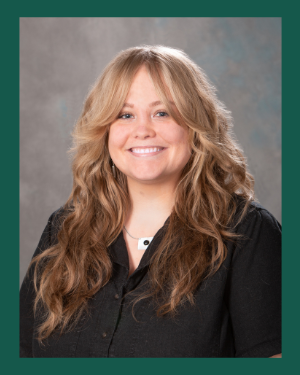We are honored to announce that our very own Colleen Floyd, Ability Access Specialist with RCPD who works with neurodivergent staff and students at Michigan State, was awarded the Disability Service Provider Award. In addition to her contributions as an Ability Access Specialist, Colleen is the staff advisor for the Council for Students with Disabilities (CSD) and works with our staff members on expanding ability and opportunity to the MSU community!
Colleen was presented the 2023 Disability Service Provider Award from the ACPA Coalition for Disability (American College Personnel Association—College Student Educators International, the Coalition for Disability) at their annual convention held March 26-29, 2023. This award is given to an individual who is a disability service provider in a postsecondary education setting. A disability service provider promotes access and inclusion for people with disabilities by working to ensure equal access to curricular, co-curricular, and extracurricular programs, activities, and services.
Interview with Colleen Floyd by the Coalition:
-
Who or what inspired you to get involved in Higher Education?
I found my home in Higher Education the moment I attended my first-year orientation at the University of Wyoming (UW). I was blown away by the instant connection the orientation leaders created and knew I wanted to don one of their gold polos the next summer. I ended up serving as both an Orientation Leader and Student Ambassador during the four years I attended UW. At the same time, I found myself taking a gender and disability course my second semester, where I was introduced to disability studies. I remember reading the words of disability scholars and immediately knowing my life had changed. This course helped me understand my disability identity and connect me with the larger community. Looking to pair my love for student affairs and disability studies, I set my goal towards working in disability services with the hopes of shifting the field to an identity and culture-based practice.
-
What do you love most about your work?
Higher education typically understands disability through an accommodation/compliance lens. Often, the disabled students, faculty, and staff I work with have internalized this more medicalized/deficit model of disability. It is an honor and privilege when I am able to introduce them to the disability community and anti-deficit approaches/understandings of disability. Being able to facilitate conversations about disability identity, disability justice, and disability studies is the reason I continue to do this work each day.
-
What advice would you offer to new professionals who are starting their first professional position?
I have only worked in this field as a full-time professional for nine months, but what I have learned so far is the importance of giving yourself grace and reflecting on your practices. For the past six years, I've understood my disability through the lens of being a student. It has taken me time to navigate what being a disabled professional means for me. I sometimes find myself internalizing ableist ideals and in these moments, I try to give myself grace and connect with fellow disabled higher education professionals. I also come to this work as a scholar-practitioner and continually consider what information I'm using to inform my decisions. I think it is important to practice reflexivity and find ways to continue learning.
Congratulations, Colleen, on your contributions as a Disability Service Provider!
